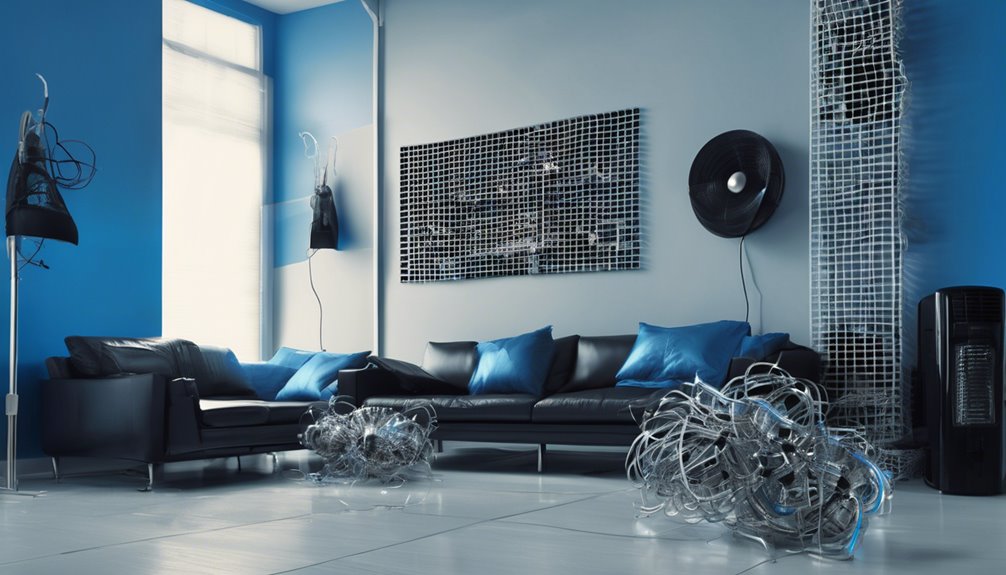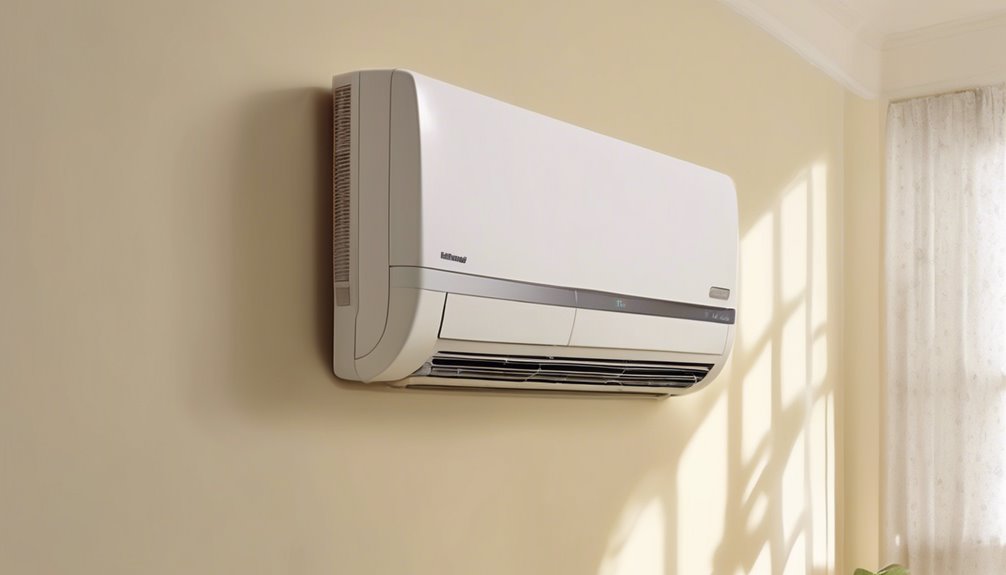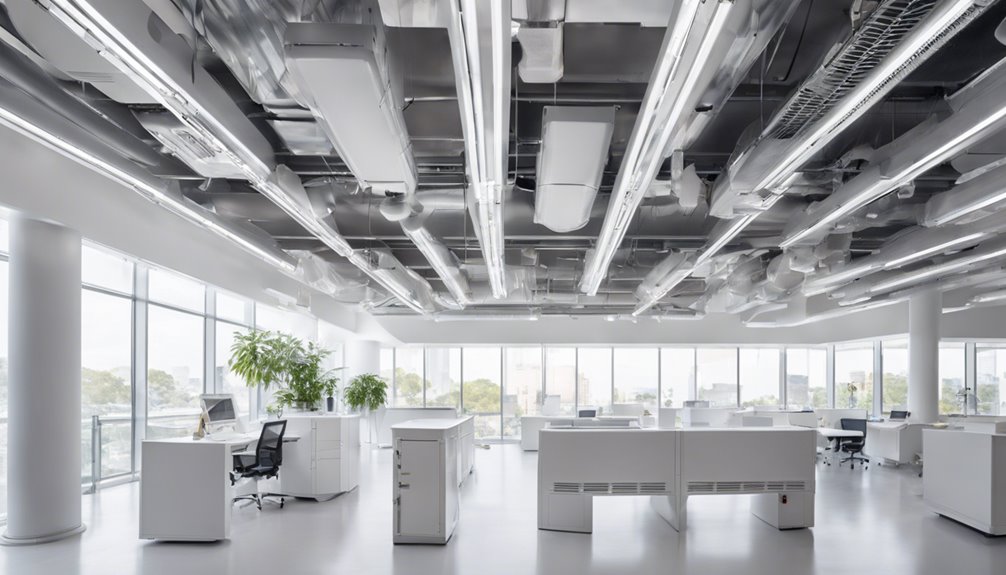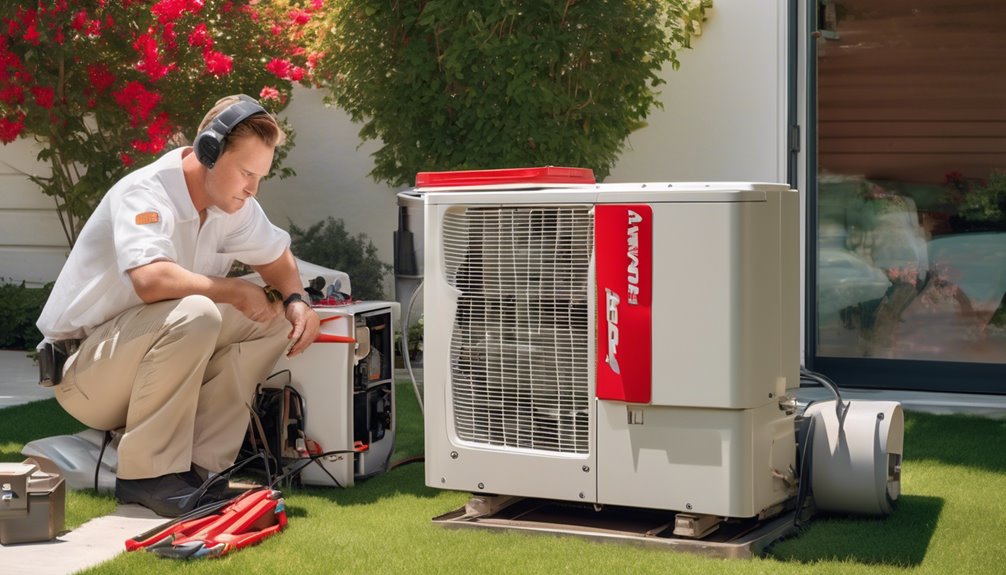Your air conditioner's high energy consumption might be due to dirty air filters, thermostat calibration issues, or leaky ducts, which can increase your bills and reduce the unit's lifespan. Maybe your AC is oversized or undersized for your space, or faulty components are causing it to work harder. Poor maintenance habits, like neglecting filter cleaning or replacement, can also drive up energy costs. If you're wondering what's behind your AC's high energy consumption, you're about to uncover the common culprits that might be to blame.
Key Takeaways
- Dirty or clogged air filters can increase AC energy consumption by making the unit work harder to circulate air.
- Incorrect thermostat settings, such as setting the temperature too low, can cause the AC to consume more electricity than necessary.
- Leaks in the ductwork or refrigerant leaks can reduce the AC's cooling capacity, leading to increased energy consumption.
- Using an oversized or undersized AC unit can result in wasted energy and increased bills due to inefficient cooling.
- Failure to maintain the AC unit, including neglecting regular cleaning and inspections, can lead to component failure and increased energy consumption.
Dirty Air Filters: The Unseen Culprit
Your air conditioner's high electricity consumption might be attributed to a seemingly insignificant component: its air filters.
Dirty filters can significantly increase your AC's energy consumption, leading to higher electricity bills. It's essential to perform regular filter inspections to identify when they need cleaning or replacement.
Dirty filters boost AC energy consumption, leading to higher bills, making regular inspections crucial for cleaning or replacing them.
Failure to do so can cause your AC to work harder, resulting in increased energy consumption. Make it a habit to clean your filters every 1-2 months, depending on usage.
A simple filter cleaning can make a significant difference in your AC's performance and energy efficiency. By staying on top of filter maintenance, you can enjoy a cooler home while keeping your electricity costs in check.
Thermostat Troubles: When Temperature Control Goes Awry
As you adjust the thermostat to your desired temperature, you mightn't realize that it's secretly contributing to your AC's high electricity consumption.
A misbehaving thermostat can cause your AC to work overtime, leading to increased energy bills. This is often due to thermostat calibration issues or temperature fluctuation.
- Thermostat calibration problems can prevent your AC from accurately reading the room temperature, leading to overcooling or overheating.
- Temperature fluctuation can cause your AC to constantly adjust its output, resulting in increased energy consumption.
- A faulty thermostat can also cause your AC to short cycle, reducing its lifespan.
- In some cases, a thermostat may not be able to communicate effectively with your AC, leading to inefficient cooling.
Regular thermostat maintenance is essential to ensure your AC operates efficiently and effectively.
Leaky Ducts: The Hidden Energy Drain
How much cooled air is escaping through the cracks? If your ducts are leaky, you're essentially throwing money out the window.
Those tiny gaps and cracks in your ductwork can add up to significant energy losses. In fact, the US Department of Energy estimates that leaky ducts can increase your energy bills by up to 30%!
To prevent this energy drain, consider duct sealing and duct insulation. Seal any gaps or cracks with mastic sealant or foil tape, and insulate your ducts with fiberglass batts or reflective insulation.
Refrigerant Leaks: The Silent Killer of Efficiency
When you suspect refrigerant leaks in your AC, you're not just dealing with a minor issue – you're staring at a trio of trouble.
These leaks silently reduce your cooling capacity, leaving you hot and sweaty with no relief in sight, while your electricity bills skyrocket.
If left unchecked, the damage will eventually spread to other parts of your system, causing even more costly problems down the line.
Leaks Reduce Cooling Capacity
Leaks in your air conditioner's refrigerant lines can be a silent but deadly efficiency killer.
They reduce your AC's cooling capacity, making it work harder to cool your space, resulting in increased energy consumption. This not only drives up your electricity bill but also shortens the lifespan of your AC.
- Refrigerant leaks can occur due to worn-out seals or damaged insulation, allowing the coolant to escape.
- Insulation gaps around pipes and joints can also lead to refrigerant loss.
- The importance of sealant can't be overstated, as it helps to prevent leaks and maintain the AC's efficiency.
- Even small leaks can have a significant impact on your AC's performance and energy consumption.
- Regular maintenance and inspections can help identify and fix leaks before they become a major issue.
Higher Bills, No Relief
Your electricity bill is skyrocketing, but your home remains sweltering.
You're not getting the relief you need, and it's costing you big time. Refrigerant leaks are the silent killer of efficiency, causing your AC to consume more electricity than necessary.
As summer strain sets in, your unit works overtime to cool your home, resulting in energy waste.
The leaks reduce the cooling capacity, forcing your AC to run longer and harder, which leads to higher bills.
You're essentially throwing money out the window, and it's not doing anything to make your home more comfortable.
It's time to identify and fix those leaks to get your energy consumption back under control.
System Damage Ensues
System damage is a real concern when refrigerant leaks go unchecked.
You're not only wasting energy, but you're also putting your entire AC system at risk.
Refrigerant leaks can cause your system to work harder, leading to system overload and increased energy waste.
This can lead to a vicious cycle of breakdowns, repairs, and even premature replacement.
- Your compressor can overheat and fail, requiring costly repairs or even replacement.
- Leaks can cause ice buildup, which can lead to further damage and efficiency losses.
- Your AC's fan motor can burn out, causing the entire system to shut down.
- Refrigerant leaks can also contaminate the air, posing health risks to you and your family.
The longer you wait, the more damage you'll incur, and the higher your energy bills will climb.
Oversized or Undersized AC Units: A Perfect Storm of Inefficiency
When it comes to air conditioning units, size matters – and getting it wrong can lead to a perfect storm of inefficiency.
You might think that a larger unit is better, but an oversized AC can waste energy, increase your bills, and even shorten its lifespan.
Conversely, an undersized unit will struggle to cool your space, leading to longer runtime and higher energy consumption.
To avoid this, it's crucial to get unit sizing right through accurate load calculation.
This involves assessing factors like your home's insulation, window size, and local climate to determine the ideal unit size for your needs.
Worn-Out or Faulty Components: A Recipe for Disaster
Faulty components can sneak up on you, causing your AC to consume more electricity than necessary.
You mightn't even notice it at first, but over time, worn-out or faulty components can lead to component failure, which can increase your electricity bill significantly.
An electrical surge, for instance, can damage your AC's internal components, leading to inefficient performance and higher energy consumption.
- A faulty compressor can consume more power than usual, leading to increased energy bills.
- Worn-out fan motors can reduce airflow, causing your AC to work harder and consume more electricity.
- Damaged or corroded contacts can lead to electrical resistance, increasing energy consumption.
- A malfunctioning thermostat can cause your AC to run continuously, resulting in higher electricity bills.
- Faulty capacitors can reduce your AC's efficiency, leading to increased energy consumption.
Poor Maintenance Habits: The Neglected AC Unit
You're probably guilty of neglecting your AC unit, and it's taking a toll on your electricity bill.
When was the last time you checked and cleaned your air filters, or straightened out those bent coil fins? If you can't remember, it's no wonder your thermostat settings are off, causing your AC to consume more power than necessary.
Dirty Air Filters Exist
Dirty air filters are the silent saboteurs of your air conditioning unit's efficiency.
You mightn't notice them, but they're working behind the scenes to increase your energy bills and reduce your AC's performance.
When you neglect to clean or replace your air filters, they become clogged with dust, dirt, and other debris.
This forces your AC to work harder, consuming more electricity in the process.
- You're not checking your air filters regularly, leading to a buildup of dirt and debris.
- You're not cleaning your air filters correctly, causing them to become damaged or clogged.
- You're not replacing your air filters frequently enough, allowing them to become worn out and inefficient.
- You're using low-quality air filters that can't capture dirt and debris effectively.
- You're not considering the MERV rating of your air filters, which can affect their performance.
Coil Fins Are Bent
Bent coil fins are a common issue in neglected air conditioning units, and they can significantly impede airflow and increase energy consumption. When coil fins are bent, it reduces the finned surface area, making it harder for your AC to cool the air. This means your AC has to work harder, which leads to higher energy bills.
| Problem | Solution |
|---|---|
| Bent coil fins | Straighten or replace them |
| Reduced airflow | Improve airflow with coil cleaning |
| Increased energy consumption | Regular maintenance to prevent issues |
Thermostat Settings Are Off
Incorrect thermostat settings can wreak havoc on your AC's performance, causing it to consume more electricity than necessary.
You might be unknowingly contributing to your AC's high energy consumption by not adjusting your thermostat settings according to the season. For instance, failing to switch to summer settings or making nighttime adjustments can lead to increased energy usage.
- Not adjusting the thermostat when you're away from home or sleeping
- Setting the temperature too low, causing the AC to work harder
- Failing to use energy-saving features like auto-mode or eco-mode
- Not programming your thermostat to optimize energy consumption
- Ignoring the recommended temperature range of 68-72°F (20-22°C)
Frequently Asked Questions
Can I Use a Higher Voltage AC to Reduce Electricity Consumption?
You're considering using a higher voltage AC to reduce electricity consumption, but be cautious – it may cause a voltage drop, leading to inefficiency, or even a power surge, damaging your unit and increasing costs in the long run.
Will Regular Cleaning of the AC Exterior Reduce Energy Bills?
You'll be surprised how regular cleaning of the AC's exterior helps! Dust buildup on coils reduces their efficiency, making your unit work harder and consume more energy. By cleaning it, you'll boost coil efficiency and lower those energy bills.
Does Using a Programmable Thermostat Always Save Energy?
You're wondering if a programmable thermostat always saves energy. While it can help, it's not a guarantee. Your energy habits and frequency of temperature swings play a significant role in determining the actual energy savings you'll experience.
Can I Install an AC Unit Myself to Save on Labor Costs?
You're considering installing an AC unit yourself to save on labor costs, but be aware that DIY considerations require significant electrical expertise, and improper installation can lead to safety hazards, void warranties, and even increase energy consumption.
Will Closing Vents in Unused Rooms Reduce AC Electricity Consumption?
You're wondering if closing vents in unused rooms will reduce AC electricity consumption. Yes, it can help, but beware of increased vent pressure, which might lead to air leakage, reducing overall efficiency and potentially causing more harm than good.
Conclusion
You've identified the likely culprits behind your AC's excessive energy consumption. Dirty air filters, thermostat troubles, leaky ducts, refrigerant leaks, inefficient unit sizes, worn-out components, and poor maintenance habits can all contribute to your AC guzzling electricity. By addressing these issues, you can optimize your AC's performance, reduce your energy bills, and breathe easier knowing you're doing your part for the environment. It's time to take control and give your AC the TLC it needs to run efficiently.



